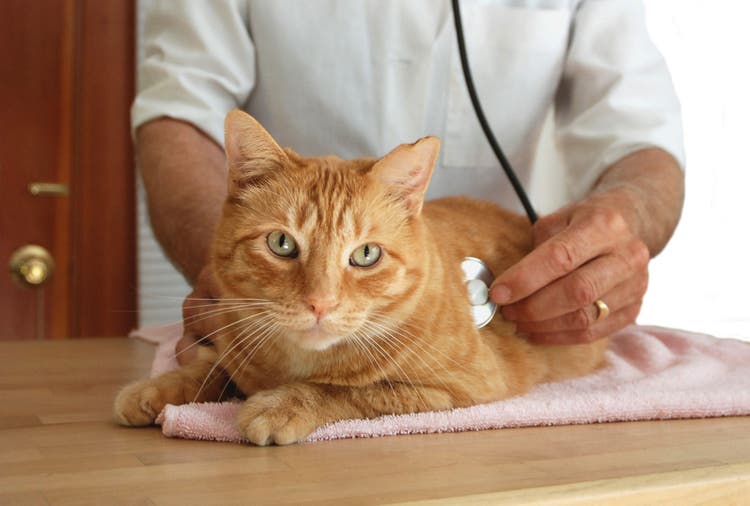
Vet Tips for Elderly Cat Care
As we age our bodies change. The same thing is true for our cats.
What do you need to know about elderly cat care? As your cat changes, so do physical and emotional needs. Ideally, elderly cat care should focus on preventative measures. Whenever possible, it is better to prevent a problem from occurring rather than to wait for a problem to develop. Detecting diseases in the early stages greatly improve the outcome.
What to be Aware of as Your Cat Ages
As your cat ages, she may lose weight. This can be part of the normal aging process, but it can also be a sign of a medical problem like cancer, kidney failure, hyperthyroidism or something else. Changes in weight can be the first sign of disease, so don’t take chances with your senior cat. If you notice any significant changes contact your veterinarian.
Elderly cat care should include regular visits to your veterinarian. Your senior cat is at risk for several medical problems as she ages, which is why she needs periodic exams to stay healthy. Some of the most common illnesses known to afflict older cats include nutritional problems, dental disease, kidney disease, hyperthyroidism, diabetes, hypertension, heart disease, inflammatory bowel disease, skin tumors, and cancer. Other concerns with elderly cats include liver diseases and anemia. To learn more about possible disorders with your senior cat, go to 10 Common Disorders of Senior Cats.
As your cat ages, your veterinarian will help to monitor any changes along the way. Most vets recommend a checkup every six months. Have your cat’s hearing and eyesight checked. It’s not unusual for a senior cat’s eyes to look cloudy. But like humans, your senior cat can develop cataracts and glaucoma. Your senior cat can also develop hearing loss. Your cat may have hearing or eyesight problems if he seems surprised when you come close, if he bumps into things, or if he doesn’t come when you call him.
Senior Cats and Nutrition
Remember that elderly cat care includes good nutrition. As your cat ages, her metabolism slows down and your older cat will require fewer daily calories. Make sure that your senior cat is eating well. There is no one best food to feed to a senior cat – the best food depends on your cat’s specific problems or nutritional requirements. Most foods for older cats are lower in protein, sodium, and phosphorus to help their aging hearts and kidneys. Increased amounts of certain vitamins have also been found to be beneficial in the senior cat.
Keep your senior cat active. Provide moderate exercise to help maintain muscle tone, to keep his heart and digestion healthy, and to improve his attitude.
Cat Obesity: A Growing Epidemic
In 2016, 58.9% of cats were classified as clinically overweight or obese.
Obesity is a problem to be taken seriously. It directly correlates to a decreased longevity and may contribute to other problems like diabetes and arthritis. According to the Pet Obesity Organization 2018 Pet Survey, over 50 million cats are clinically overweight or obese.
The primary causes of obesity are overeating and lack of exercise. When regular caloric intake exceeds the energy burned, the excess is stored as fat. As little as an extra 1 percent caloric intake can result in 25 percent increase over ideal body weight by middle age. Most owners don’t recognize that their cats are overweight until they take them to the veterinarian for another reason. To learn more about how to tell if your cat is overweight, go to Is Your Cat Too Fat.
If your senior cat has arthritis, there are some things you can do to help. Consider buying a set of pet stairs to help your cat more easily access the bed or sofa. Give your senior cat a soft yet supportive place to sleep. Consider a good glucosamine supplement. To learn more about arthritis in cats, go to Arthritis in Cats: Does Your Cat Have Arthritis
As a rule, cats don’t like change, and this is especially true for older cats. Your senior cat is set in her ways. Stick to a regular schedule. Feed your cat at the same time every day. Cats love a routine, and they will appreciate it even more as they age. Any changes in daily routine, schedules or environment will cause undue stress. Stress can weaken your cat’s immune system and make her more susceptible to disease, so keep change to a minimum.
Cats are good at hiding illness and this is just as true for elderly cats. Diseases can be treated with better outcomes when they are caught early so it is important to carefully monitor your senior cat’s behavior and health, and to have regular checkups with your veterinarian.
To learn more about elderly cat care, go to Show Some TLC: How to Help Your Geriatric Cat Thrive.